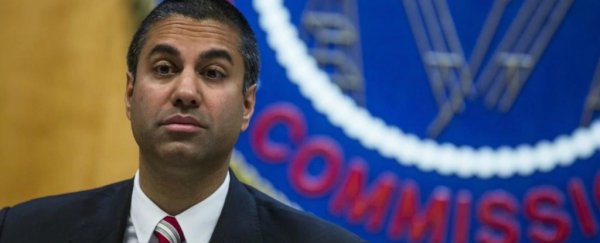The FCC's net neutrality vote has finally been published in the Federal Register, the government's official record of all administrative actions. The moment is key, because it kicks off the next phase of the fight over the future of the Internet. Here's what to expect.
In December, the Federal Communications Commission voted to repeal its net neutrality rules for internet providers – a move aimed at deregulating the industry and allowing companies such as AT&T and Verizon to legally slow down websites, block apps, and even charge content companies extra fees for priority access to consumers' screens.
None of this has occurred so far; not only must the substance of the new rules take effect, but many internet providers say they aren't interested in blocking or slowing websites, while critics of the industry have said it would be too obvious to try that type of behavior right out of the gate.
Until now, opponents of the FCC vote have talked a big game about taking the agency to court, in hopes of overturning the decision.
They have also sought to build momentum for a congressional resolution to force the FCC to take back its vote and restore the old net neutrality rules.
Both initiatives needed to wait until the decision was published in the register before they could move forward. Now that it's officially out for review, that can happen.
To be clear, the publication in the Federal Register enables Congress and the public to take action, but the substance of the new rules won't go into effect until the FCC takes care of some additional paperwork.
This is what comes next: First, Senate lawmakers who supported net neutrality rules now have 60 legislative days to find one Republican who's willing to break ranks with his or her party and support the resolution under the Congressional Review Act, or CRA.
They already have 50 votes, including all Democratic senators and one Republican, Sen. Susan Collins of Maine. But they need 51 votes to pass the measure.
Sixty legislative days is not the same as 60 calendar days, due to the way Congress's work schedule operates. But it's nevertheless a relatively short window in which lawmakers may seek to block the FCC.
The resolution faces long odds; analysts say it's unlikely to come to a vote in the House and that even if it somehow passed that chamber, President Trump is almost certain not to sign it.
Still, critics of the FCC say, the measure would force lawmakers to pick a side, during a campaign year, on an issue on which Americans are generally united.
"The FCC and Chairman [Ajit] Pai just triggered a timeline that will culminate in a Senate vote on my resolution, and we cannot let up until we win," said Sen. Edward J. Markey (D-Mass.), who is leading the CRA effort.
Meanwhile, those seeking to challenge the FCC in court will now be filing their lawsuits. Many of them are likely to come within the next 10 days, said Harold Feld, senior vice president of the consumer advocacy group Public Knowledge.
"All petitions filed in the first 10 days are considered to be filed simultaneously," he said.
Indeed, on Thursday a number of groups filed petitions challenging the FCC, including Public Knowledge, the California Public Utilities Commission, and a group of 22 state attorneys general led by New York.
There's a reason for the rush: The next few days will be critical for determining which federal appeals court actually hears the case against the FCC.
In these situations, the venue is selected by a lottery, and the output of the lottery is determined by which courts have received a lawsuit on the issue. Among the courts already in the mix are the US Court of Appeals for the D.C. Circuit as well as the US Court of Appeals for the Ninth Circuit.
There's an element of strategy involved here. Some courts are considered friendlier to industry; others not. So both sides of the net neutrality issue - even those who supported the FCC's December vote - have an incentive to ask for court review.
Those who opposed the FCC vote will file their lawsuits in courts where they believe they have a good shot at winning. The same goes for those on the other side of the issue. Then the lottery will decide which court hears the case.
So that's what's on deck for the next few weeks as the net neutrality fight heats up again.
2018 © The Washington Post
This article was originally published by The Washington Post.
